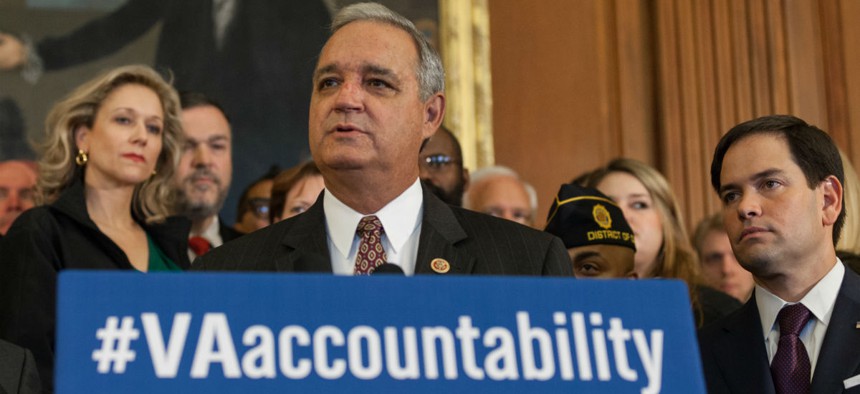
Rep. Jeff Miller, R-Fla., said he did not reach the decision to issue subpoenas lightly. Caleb Smith/House Speaker John Boehner
VA Senior Execs Subpoenaed To Testify Over Pay Raises, Relocation Benefits
Watchdog concluded department officials inappropriately used authorities to get around pay freeze.
A congressional panel on Wednesday subpoenaed five employees of the Veterans Affairs Department to testify next month about questionable relocation expenses and pay raises for senior executives.
“Today represents just the fourth time in committee history that a subpoena has been called for, and the first time that we will vote on a subpoena compelling individuals to appear and provide testimony,” said House Veterans’ Affairs Committee Chairman Jeff Miller, R-Fla. “I assure you that I have not come to this decision lightly.”
The employees – all from the Veterans Benefits Administration -- are Danny Pummill, principal deputy undersecretary for benefits; Diana Rubens, director of the Philadelphia and Wilmington, Del., regional office; Robert McKenrick, director of the Los Angeles regional office; Kimberly Graves, director of the St. Paul, Minn., regional office; and Antione Waller, director of the Baltimore, Md., regional office. The five did not show up at a hearing Wednesday morning to answer questions about a recent inspector general report concluding that VBA managers reassigned senior executives to circumvent a pay freeze, and also paid many of those executives unjustified relocation incentives.
Miller has scheduled another hearing on the issue for Nov. 2 at 7:30 p.m. The chairman said he was going to invite Allison Hickey, former VA undersecretary for benefits, to testify on Nov. 2, along with the subpoenaed witnesses. Hickey, who recommended Rubens for the reassignment to Philadelphia and a relocation incentive, resigned from the department on Oct. 16.
On Wednesday, Deputy IG Linda Halliday summarized the watchdog report and fielded questions about relocation incentives for senior executives, and the rules around pay. Miller asked the IG to look into the issue after an April hearing involving Rubens.
VBA spent a total of about $1.8 million on 23 reassignments from fiscal 2013 to fiscal 2015, the IG found. All but two of the reassignments came with pay raises, the watchdog noted, despite an Office of Personnel Management freeze on Senior Executive Service pay from 2010 through 2013, and a separate VBA ban on bonuses in 2012 due to lack of progress addressing the backlog of outstanding disability benefits claims.
The IG found that the nearly $300,000 paid to relocate Rubens from a higher-profile job in Washington to director of the Philadelphia VA regional office in 2014 was “generally allowable,” though there were some smaller issues including with her use of the Appraised Value Offer program. “More importantly, the OIG concluded that Ms. Rubens inappropriately used her position of authority for personal and financial benefit when she participated personally and substantially in creating the Philadelphia VARO director vacancy and then volunteering for the vacancy,” the IG stated.
The watchdog found that another VA official – Graves – similarly helped create a vacancy (this one at the St. Paul VA Regional Office) and then volunteered to fill it.
Both Rubens and Graves took on fewer job responsibilities in their new positions but kept their previous annual salaries of $181,497 for Rubens and $173,949 for Graves, the IG noted.
According to the report, Waller and McKenrick had to relocate to jobs they did not want to make room for Graves and Rubens.
“The witnesses who were requested, were requested for a reason, as they were the central figures of this IG report, a report that was issued to the public unredacted,” Miller said. “They were asked to be here today to go over the facts of the report – not to determine their innocence or guilt. It’s as simple as that.”
Deputy Secretary Sloan Gibson offered to testify in place of the five witnesses, but Miller said that was inappropriate since Gibson has the authority to fire those at the center of the controversy.
“The department has raised concerns about holding this hearing in the first place saying that it could possibly jeopardize any personnel actions that could be taken as a result of this report; so why was VA going to send the exact official who has the authority to remove Ms. Rubens and Ms. Graves to testify at today’s hearing? I am sure that in any appeal to the [Merit Systems Protection Board], the argument could be made that he was influenced by Congress,” Miller said.
Members of the committee asked Halliday several questions about the relocation program involved, and why Rubens and Graves were able to retain their salaries despite moving to positions with fewer responsibilities.
OPM offers recruitment, retention and relocation incentives to employees for hard-to-fill jobs. Employees can only receive a relocation incentive when their performance rating is at least or equivalent to “fully successful.” The Appraised Value Offer program, managed by the General Services Administration, provides relocation services to employees to encourage them to move to locations that require specialized skills. The program allows a government contractor to buy the employee’s home if it doesn’t sell in 60 days. VA Committee Ranking Member Corrine Brown, D-Fla., said she was going to ask the Government Accountability Office to review the AVO program governmentwide.
Amelia Gruber contributed to this report.
(Image via Flickr user Caleb Smith/Speaker John Boehner)







